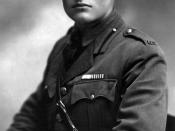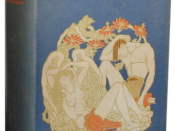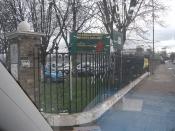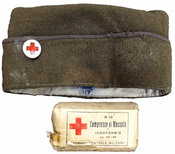The Italian front of World War I, reflected every unfortunate aspect of war. The effects were far reaching; nearly 600,000 Italian soldiers lost their lives, and more than a million were wounded. Among both the enlisted and civilians, no person escaped the poisonous touch of the war. Such was the case with Frederick Henry, an American architecture student in Rome at the time the war began. When he joined ranks as an Italian Lieutenant, Frederick never anticipated the misery that would accompany military life. However, save a few chapters mid-novel, Hemingway's A Farewell to Arms was by no means a painful account of the tribulations and tragedies of war. In the midst of evil, Frederick finds salvation in the form of love which was clearly shown but in a mature manner. His relationship with Catherine Barkley is a relief from the barbarity. Their "union"� led him to establish his own principles and was ultimately his refuge from the massive chaos of war.
I was given several clues throughout the novel that foreshadowed Catherine's role in Frederick's development as well as the impact that their relationship had on his life. Throughout the novel I could trace a pattern of regression from the war, each time mirrored by a progression in his attachment to Catherine. By the novel's conclusion, I saw a reformation occur in Frederick Henry. He was transformed from a disillusioned young man, into an aged soul that had suffered life's greatest agonies: to lose in love and to lose in war.
When I was first introduced to Henry, he was arrogant and had yet to establish any parameters for his life. I was given no indication of why he abandoned architecture to join a foreign army. I was left to assume that it was an impulsive measure, probably an attempt to establish routine or order in a chaotic life. Immediately Henry exhibits dwindling enthusiasm for the war. When conversation at the dinner table turns to the topic of where Frederick ought to vacation on his leave, I recognized critical example of his immaturity. The officers, who took joy in chiding of the priest to the outfit, insisted that Henry visit the whorehouses in each of their favorite cities. The priest however, extended a warm invitation for Frederick to visit his family's scenic, picturesque hometown. I had not yet seen Fredrick appreciate the value of the untainted and cleansing countryside, and I saw him opt for "nights in bed, drunk, when you knew that that was all there was . . .not caring in the night, sure that this was all and all not caring."� When he returned to the front, he experienced deep remorse for ignoring an opportunity to see a place where "it was clear cold and dry and the snow was dry and powdery and hare-tracks in the snow and peasants took off their hats and called to you."� I even realized the language and voice which Hemingway used to describe the contrasting locations highlights the fallacy in his choice.
I noticed that Frederick was longing for something greater than what could be satisfied by cheap alcohol and solicited sex, but he had not began to understand his own neediness. Responding to Frederick's pun in regard to "army life,"� Hemingway followed with a series of chapters introducing and developing the character of Catherine Barkley. Initially, it is clear to me that Catherine and her bizarre games puzzle Henry. The priest clarified the difference between true love and Frederick's lust, "When you love you wish to do things for. You wish to sacrifice for. You wish to serve."� And although he consented that he did not feel love for Catherine, he preferred her company to that found in the brothels. As though he has learned his lesson by forgoing the trip to the countryside, Frederick chooses to endure her eccentricities at the chance of establishing a relationship. At this point, the only type of relationship I know he desired with her is a sexual one, but by fostering the necessary trust to entice her to bed, he accidentally began to fall in love.
Later I realized dramatic changes in Frederick's life. During a portentously ironic stream of consciousness, Frederick divulged his bold regard for the war. "I knew I would not be killed. Not in this war. It did not have anything to do with me."� What Frederick chose to ignore was that the mortar shells and bullets were impartial. The enemy was the enemy, and the Austrians wanted Italian soldiers dead. As chance would have it, just such a trench mortar plowed through Frederick's dugout the next day while he was stationed near Plava, and although he withstood the pain calmly, it was immense and the damage to his body was extensive. This served only to further remove Frederick's commitment to the Italy's cause. It was then that I saw Frederick finally established an exacting set of criterion by which he intended to live. He began to differentiate between hollow pleasure and philosophical fulfillment. This was demonstrated to me by his rejection of the attempts to decorate him for his "bravery,"� as he insisted that there was nothing brave about hiding in a dugout eating macaroni. Conversely, in his conversation with the priest, Henry showed an eager interest in understanding what it means to feel love. Frederick's transformation was on the brink of emergence, and in Hemingway's response to this foreshadowing, I again saw how he uses the relationship with Catherine to actualize this growth. This twist of fate was Hemingway's tool for a transition into the most significant period of development in the couple's relationship. He was undoubtedly captivated by her mere presence. "She came in the room . . . she looked fresh and young and very beautiful. When I saw her I was in love with her,"� explained Frederick. He no longer was the simple creature that could feel fulfilled and contented by casual sex. He sampled the love of which the priest spoke so highly and concurs that its splendor is unsurpassed. Despite any previous reservations, Frederick willingly and completely committed to Catherine. In fact I saw it was he who encourages a legal wedding between the two, but Catherine insists that a ceremony is unnecessary. "What good would it do to marry now? We're really married. I couldn't be any more married . . . There isn't any me. I'm you. Don't make up a separate me."� Her idea of their "oneness,"� paired with her open-minded tolerance, made her the ideal partner to support Frederick in his upcoming trials in my mind.
Later Frederick was ushered back to the front, where he found himself entirely detached from army life. He no longer associated with an existence that represents hollow pleasures and is not attracted to the rigidity and order associated with the army. Nonetheless, in the midst of an enormous retreat, I noticed all he could find was confusion and disorder. Frederick was gaining respect for the finality of death as he is a first hand witness of the deaths of colleagues. Finally, the desertion was his ultimate act of self-actualization and commitment to Catherine. Henry made a "farewell to arms"� and washed himself of any responsibility to a war in which he had little interest.
A little further in the novel was a brief interlude of peace and normalcy for the couple. Once they had escaped to Switzerland, Catherine and Frederick anticipated an idyllic existence. But I later saw a close at their heels, and an unimaginable tragedy loomed in Hemingway's foreboding words, "If people bring so much courage to this world the world has to kill them to break them, so of course it kills them."� Of course, Hemingway had given away the ending to me, but only as the novel ended, was I aware of the magnitude of Frederick's loss. I came to a conclusion that Frederick was a transformed man, schooled by Catherine's love, forever changed by the war, and a completed person for their time together.





